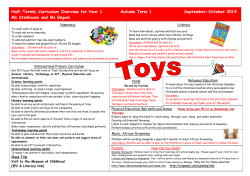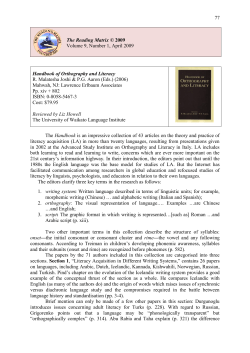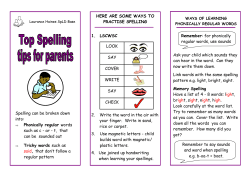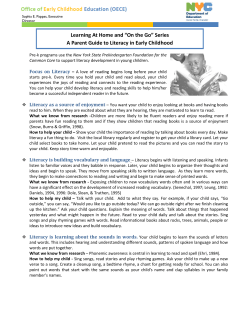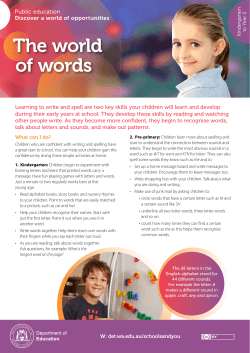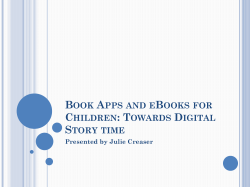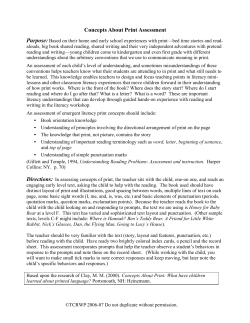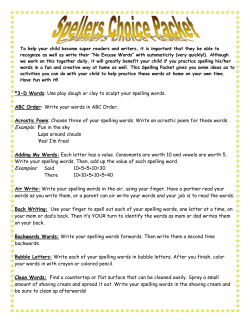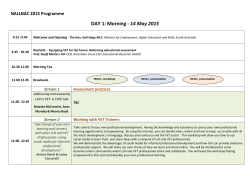
TEACHER PROFESSIONAL LEAVE: TEAM OF TEACHERS Pamela Anderson, Susan Mc Sweeney,
TEACHER PROFESSIONAL LEAVE: TEAM OF TEACHERS Pamela Anderson, Susan Mc Sweeney, Christine Robinson, Kylie Ferguson Ballam Park Primary School KNOWLEDGE BANK http://www.sofweb.vic.edu.au/knowledgebank November 2006 Developing Partnerships to Enhance Learning: Lets Keep Learning Pamela, Susan, Christine and Kylie wanted to raise student-learning outcomes in literacy and numeracy in line with Like Schools or Beyond. They observed improved spelling and handwriting skills throughout the school; children have increased confidence during speaking and listening activities and the Team have improved student transfer of information from the spoken to the written form. Knowledge Bank Template for Teacher Professional Leave Team 1. Title Developing Partnerships to Enhance Learning: Lets keep Learning 2. Activity Undertaken Project Based, Action Research and Short Courses 3. Context of school Southern Metropolitan Region, 460 students, 33 staff, like School Group 7. 4. Area that TPL Addresses Pedagogy – developing partnerships in literacy and numeracy 5. What we tried to improve: Our proposal was to raise student-learning outcomes in literacy and numeracy in line with Like Schools or beyond. Our identified outcomes supported the direction of the two current charter priority areas. • To improve student-learning outcomes through increased student engagement and connectedness to school. • To increase literacy outcomes at the Prep level. The Prep data revealed a declining trend in Prep literacy levels over previous charter period. 6. What has been achieved • • • • • 7. Implemented changes to Prep programs including: Individual assessment prior to commencement of Prep program, alteration to finishing times, library available for shared reading sessions after school for the first month. Undertook professional development in literacy and numeracy. Implemented strategies explored at PD into literacy and numeracy programs View alternative programs through school visits Shared learning through team meetings and professional development sessions for staff and parents. What has been learnt • • • Oral Language is the foundation for all learning. It is essential for literacy learning and students’ social well being. Poor phonological knowledge restricts reading accuracy, and poor oral language restricts comprehension. Time spent on phonemic awareness is good for articulation/speech. • • 8. This Learning has been applied to practice by • • • • • • 9. • • • • Improved spelling and handwriting skills have been observed throughout the school. Increased confidence during speaking and listening activities. Increased parent knowledge of how to assist their children with their learning. Improved student transfer of information from the spoken to the written form. Bench marking results will be analysed in the areas of Mathematics and English. The Future • • • • 11. Compiling activity boxes and resource folders for each year level in oral language, including a list of suitable teacher references. TPL Team working with the prep teachers to plan the implementation of the oral language activities/boxes. Implementing the THRASS Program throughout the junior school, emphasising correct articulation and discrimination of phonemes. Students practising handwriting daily. Teaching students’ how words sound, how they are made and the patterns within them. Sharing of ideas, activities and best practice in early years maths with an emphasis on helping students who are deemed mathematically at risk. Impact on Student Learning Outcomes • 10. Students learn by being involved and having time to discuss their work. Students need to discuss, compare and reflect on strategies used with their peers as well as the teacher. They need to “think aloud” and talk about the methods they are using to solve problems. Teachers need to model and demonstrate effective strategies and explicitly teach so students are challenged not threatened. To continue to raise student-learning outcomes in literacy and numeracy. Build on teacher knowledge of best practice and suitable activities for improved student learning. To develop a uniform approach to the teaching of spelling throughout the school. To continue and further develop the initiatives introduced in the Prep area this year. Contact details Pam Anderson Ballam Park Primary School Email: anderson.pamela.c@edumail.vic.gov.au An individual team member response: Susan McSweeney, Christine Robinson, Kylie Ferguson 1. The specific area you have addressed within the team TPL focus We have focused on the teaching of spelling and handwriting in my classroom. We are more conscious of the development of phonemic awareness and approach spelling as an auditory to visual process. We have set up resources for teachers use to explicitly teach oral language skills. 2. Your role within the team We selected and ordered materials for oral language boxes and typed oral language activity cards. We presented at staff and parent PD sessions. We attended PD sessions in literacy/numeracy and visited other schools with alternative programs. 3. What you have achieved We have revised our classroom program to incorporate new learning and we are observing positive results within the class. We have shared our learning and experiences with other staff and this has encouraged them to implement new strategies. We have involved parents in their children’s learning by sharing our knowledge and experiences. 4. What you have learnt Key Learning Importance of phonemic awareness Improved understanding of the linguistics of English Language & how we can best help children with spelling. Oral language is the foundation for all learning and essential for literacy learning. Speaking and listening skills need to be assessed and explicitly taught. Number sense and the development of counting strategies and problem solving is more important than learning rules which can confuse mathematically challenged children. Children should not be rushed into formal written algorithms. Learning activities that most promoted learning THRASS PD Language disorder program briefing School visit to Mill Park Heights Curriculum day with Anne Hammond Maths for at risk children (ACER) Sunshine maths with Sue Fine 5. How this learning has been applied (or intended to apply) to practice • • • • • Daily handwriting practice with simplified letter formations. Spelling taught through the introduction of phonemes (sounds in words) and the graphemes (spelling choices) used to spell them. Teaching letters names. Letters do not have sounds until they are in a word. Providing opportunities for children to share their ideas and discuss their strategies. Developed maths bags to go home to involve parents in their children’s learning. An individual team member response: Pam Anderson 1. The specific area you have addressed within the team TPL focus I have focused on the teaching of spelling and oral language in my classroom. I am more conscious of the development of phonemic awareness and approach spelling as an auditory to visual process. I have shared my learnings with the sub-school and the Charter Priority Committee (to improve learning outcomes in the Prep year). I have set up resources for teachers use to explicitly teach oral language skills. 2. Your role within the team As leader of the Professional Leave I organised and convened meetings to decide on our initial overall plan and specific roles within the team. I reported our progress to the School’s Leadership team, whole staff and School Council. I contacted schools to arrange visits and oversaw the documentation of our project. I presented information on the THRASS program and oral language program at staff and parent PD sessions. I attended PD sessions in literacy/numeracy and visited other schools with alternative programs. 3. What you have achieved • • • • I have led the TPL team in implementing positive change to our literacy and numeracy programs. I have revised my classroom program to incorporate new learning and am observing positive results within the class. I have shared my learning and experiences with other staff and this has encouraged them to implement new strategies. I have involved parents in their children’s learning by sharing my knowledge and experiences. 4. What you have learnt Key Learning Importance of phonemic awareness Improved understanding of the linguistics of English Language and how we can best help children with spelling. THRASS PD Oral language is the foundation for all learning and essential for literacy learning. Speaking and listening skills need to be assessed and explicitly taught. Language disorder program briefing School visit to Mill Park Heights Curriculum day with Anne Hammond Number sense and the development of counting strategies and problem solving is more important than learning rules which can confuse mathematically challenged children. Children should not be rushed into formal written algorithms. 5. Learning activities that most promoted learning Maths for at risk children (ACER) Sunshine maths with Sue Fine How this learning has been applied (or intended to apply) to practice • • • • • Daily focus on phonemes and graphemes in relation to spelling vocabulary. Incorporating use of THRASS wall chart and individual charts to support students in their writing. Providing opportunities for children to share their ideas and discuss their strategies. Planning for specific oral language activities in weekly program. Daily use of maths games to enhance student engagement and reinforce concepts. Six months on: Sue McSweeney, Pamela Anderson, Kylie Ferguson, Christine Robinson, 1. Has the learning been sustained? How? Yes – The oral language program has continued to be used every week in our Junior grades with timetabling for the activities being more formalised this year. It has been extended to incorporate peer support sessions in year 1. A group of parents have also been trained to assist with these sessions in the Prep area this year. The THRASS program has been extended into more year levels and further resources have been purchased to support the implementation. Major changes to planning our literacy programs have ensued. The main drivers have been the TPL team members and the English Committee team members. 2. What has supported/inhibited sustained learning? The sustained learning has been supported by the leadership team and the English Curriculum Leader and involvement of staff members. What further learning has taken place? Budget allocation to allow for two more teachers to be trained in THRASS methodology and purchase of resources to support classroom programs initiating THRASS has assisted in sustaining and building the knowledge base. Budget constraints have prevented all staff members being trained. Teachers from three other schools have visited Ballam Park to see our literacy program initiatives in action. Teachers have been informed about our initiative through our presentation at the TPL Seminar and through the Knowledge Bank. 3. What are the major changes that have taken place over the last six months? Impact on student learning outcomes Improved handwriting and spelling strategies in Junior school Improved understanding of linguistics and increased auditory awareness in the Junior and Middle School. Impact on your own practice Teaching practices that better support student learning particularly in spelling and writing. (Phoneme, grapheme approach) Measures used to evaluate Moderation tasks Formal testing Annotated work samples Teacher observations Measures used to evaluate Moderation tasks Formal testing Annotated work samples Teacher observations Principal’s input 4. What has been the impact of Teacher Professional Leave on the school and the individual teacher’s practice? Following the TPL and the introduction the THRASS program into the school there has been a more consistent and dynamic approach to the teaching of spelling and writing. This is particularly so in the junior school and areas of the middle school where teachers have undergone training. Other teachers are requesting to be trained but financial constraints prevent us from providing everybody with the opportunity. The teachers who were in the TPL team are assisting with the implementation of exemplary teaching practices and strategies throughout the school by providing whole staff professional development as well as providing individual support. This experience has helped the teacher member of the TPL team to refine and enhance her teaching of literacy as well as providing leadership experience in running professional development sessions for our staff and hosting staff from other schools who have visited the school to observe the initiatives being employed.
© Copyright 2025
